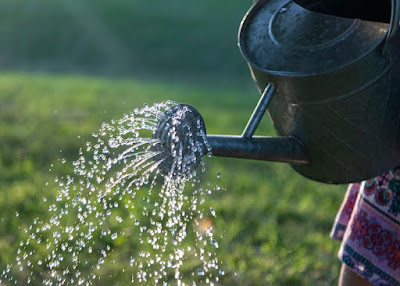- Get link
- X
- Other Apps
- Get link
- X
- Other Apps
Food composting at home is an effective and sustainable way to manage food waste while creating nutrient-rich soil for your garden. By composting food waste at home, you not only reduce waste in landfills but also create a valuable resource that can benefit your plants and flowers. In this guide, we will take you through 10 easy steps to start composting food waste at home. From choosing the right bin to adding the right mix of ingredients, we'll cover everything you need to know to get started on your composting journey. By the end of this guide, you'll have the knowledge and confidence to create your own compost and contribute to a more sustainable lifestyle.
Here are the 10 easy steps to start composting with food waste at home.
STEP 1.
The first step is to choose the right compost bin for your household, which should be the appropriate size and have a lid to prevent pests from getting in.
STEP 2.
Next, find a suitable location that is well-draining, has good airflow, and some shade to prevent drying out too quickly.
STEP 3.
Start with a base layer of twigs, leaves, or shredded paper at the bottom to aid in drainage and aeration.
STEP 4.
Collect food waste such as fruit and vegetable scraps, eggshells, coffee grounds, and tea bags in a separate container, and add them to the compost bin.
STEP 5.
To balance the food waste, add brown materials such as dried leaves, shredded paper, or cardboard, which provide carbon essential for the composting process.
STEP 6.
Water the compost regularly to keep it moist, but avoid overwatering. It is recommended to maintain the moisture level similar to that of a wrung-out sponge.
STEP 7.
Mix the materials in the compost bin regularly using a pitchfork or shovel to speed up the process by adding oxygen and breaking down clumps.
STEP 8. Monitor the temperature of your compost, which should remain between 110-160°F, optimal for the bacteria that break down organic matter in your compost.
STEP 9.
Be patient and wait for the compost to decompose, which may take 2-6 months, depending on the materials used and the composting conditions.
STEP 10. Once the compost is ready, use it as a nutrient-rich soil amendment by spreading it on top of the soil or mixing it in with the potting mix.
Here are some Questions People also search for.
Q. What kitchen waste can be composted?
There are various types of kitchen waste that can be composted, such as fruit and vegetable scraps, eggshells, coffee grounds, tea bags, bread and grains, nut shells, and even small amounts of meat and dairy products. However, it is important to add the latter sparingly and bury them deep within the compost.
Q. How many days does it take for kitchen waste to compost?
After 2 to 3 months, the pile should begin to develop compost that appears dry, dark brown, and crumbly, with an earthy aroma.
Q. Is kitchen waste compost good?
Yes,Composting kitchen waste at home is a great way to reduce waste and create a nutrient-rich soil amendment for plants and gardens. Using kitchen waste compost is beneficial for the environment and can improve soil structure, increase water retention, and promote healthy plant growth. It's important to ensure that the composting process is done correctly to avoid any issues with odors or pests.
Q. What are 3 things you shouldn't compost?
Meat and dairy products: These items can attract pests and create unpleasant odors as they decompose. They can also introduce harmful bacteria to the compost, which can be problematic when the compost is used on edible plants.
Greasy or oily foods: These can also attract pests and create odors. They can also slow down the composting process and make it more difficult to achieve a balanced compost.
Diseased or insect-infested plants: These can introduce pathogens or pests to the compost, which can then be spread to healthy plants when the compost is used in the garden. It's best to dispose of these types of plants in the trash, rather than composting them
Q. Can cooked rice go in compost?
YES, Cooked rice is a suitable addition to compost as it provides a good mix of carbon and nitrogen and can decompose quickly when added to a balanced compost pile. However, it's advisable to add cooked rice in small quantities to avoid clumping and to ensure proper airflow. It's also important to mix it well with other compost materials to prevent mold and bacterial growth.
In summary, composting with food waste at home is a simple and effective way to reduce waste and contribute to a more sustainable lifestyle. By following these simple steps, you can start composting today and create a valuable resource for your garden.
Blog post by Muskan Sanadi
10 easy steps to start composting with food waste at home
compost in your kitchen
food composting at home
food waste composting at home
kitchen composting
- Get link
- X
- Other Apps



.jpeg)







Comments
Post a Comment